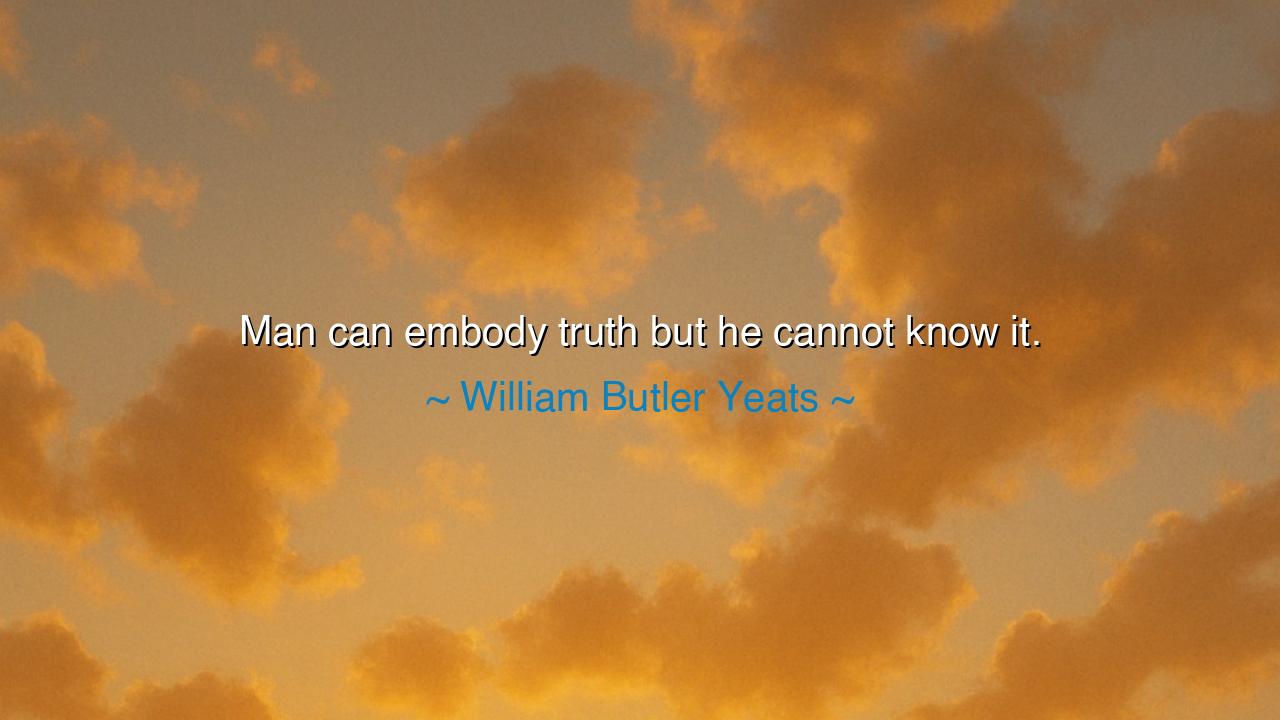
Man can embody truth but he cannot know it.






Hear, O seekers of wisdom, the words of the poet William Butler Yeats, who gazed into the mysteries of spirit and time and uttered: “Man can embody truth but he cannot know it.” These words resound like a riddle carved in stone, yet they are not beyond our grasp. They speak of the limits of human thought, and of the greater glory of human living. For Yeats teaches that truth is not a jewel to be fully possessed by the mind, but a flame that can be carried in the heart and expressed in deed. Man may never comprehend the infinite, but he may embody its light, if only for a season.
The origin of this wisdom comes from Yeats’s long wrestling with philosophy, mysticism, and the fate of nations. He saw how men quarreled endlessly about what is true—priests, scholars, and rulers each proclaiming their own certainty. Yet none could grasp truth in its fullness, for the infinite cannot be confined by the finite mind. Still, Yeats saw that though men may not know truth in all its depth, they may embody it by living with courage, love, and integrity. In this way, truth enters the world not as doctrine, but as life itself.
Consider the example of Mahatma Gandhi. He never claimed to have mastered ultimate truth; indeed, he often said he was but a seeker. Yet through his way of life—his nonviolence, his simplicity, his unyielding stand for justice—he embodied truth before the eyes of millions. It was not his philosophical reasoning alone that moved the world, but the living example of a soul in harmony with a higher order. His life was a testament to Yeats’s words: though man cannot fully know truth, he may live it, and in living it, reveal it.
The ancients also understood this paradox. Socrates declared that he knew nothing, yet he lived with relentless devotion to honesty and inquiry. The Buddha spoke of enlightenment beyond words, yet his very presence radiated compassion and wisdom. These figures remind us that truth is not merely in the scroll or the syllogism, but in the way one walks, the way one loves, the way one suffers with dignity. To embody truth is to make it flesh, even when the mind falters before its full mystery.
Yeats’s saying is also a warning. Many have claimed to know truth perfectly, and from their claims have sprung wars, persecutions, and chains. For when a man believes he owns truth, he will crush others in its name. But the one who humbly embodies truth does not wield it as a weapon; he bears it as a light. He does not say, “I possess the whole,” but rather, “I walk in the little that has been given me.” Such humility guards against pride and violence, and keeps the heart open to greater revelations.
Therefore, my children, the lesson is this: do not seek to master truth as if it were a captive to your mind. Instead, seek to live it. Let your words be honest, your actions just, your heart compassionate. Even if your knowledge falters, your life can still bear witness to something eternal. In this way, you will embody truth far more powerfully than if you sought to define it with clever arguments.
In your daily walk, practice this art. When you face injustice, stand against it with courage—that is embodying truth. When you meet a stranger, treat them with kindness—that too is embodying truth. When you labor with diligence, when you speak with sincerity, when you forgive with mercy, you bring truth into the world, though you may not fully know its nature.
So let Yeats’s words guide you: “Man can embody truth but he cannot know it.” Do not despair at the limits of knowledge; rejoice in the power of life itself. For to live truthfully is greater than to define truth. To walk in light is greater than to measure it. And in the end, it is not the philosopher’s book but the just man’s life that reveals truth most clearly to the generations to come.






DTVan Anh Dinh Thi
This is an interesting take on the limitations of human knowledge. What does Yeats mean by ‘embodying’ truth? Is it through our actions, beliefs, or maybe even the way we live? Can we truly embody something we don’t fully understand, or is this idea of embodying truth simply about accepting our inability to completely know it?
NTle thi ngoc thuy
I like the idea that man can embody truth, but I wonder: what happens when people embody different truths? If everyone has their own version of truth, how do we decide which one is truly ‘right’? Can truth ever be universal, or is it always subjective based on personal experiences and beliefs?
QHBanh Quang Hao
I wonder if this quote implies that truth is something we can feel and express, but not fully articulate or understand. Could truth be more of an experience rather than a definable concept? What does it mean to embody truth if we can never fully grasp it, and how do we reconcile that with our need for certainty and clarity?
NJNekomi Japan
It’s a deep perspective, isn’t it? We often strive to understand the truth, but Yeats seems to suggest that it’s beyond human comprehension. Does this mean that our search for truth is ultimately an endless journey? Can we be at peace with never fully knowing it, or is that a frustrating thought for some of us?
TTNguyen Pham Thao Trang
This quote makes me think: is it possible for us as humans to ever fully understand truth, or do we only grasp fragments of it through our experiences? Maybe the idea of embodying truth is more about living with integrity and alignment to what we believe is true, rather than fully knowing the abstract, infinite nature of truth itself.